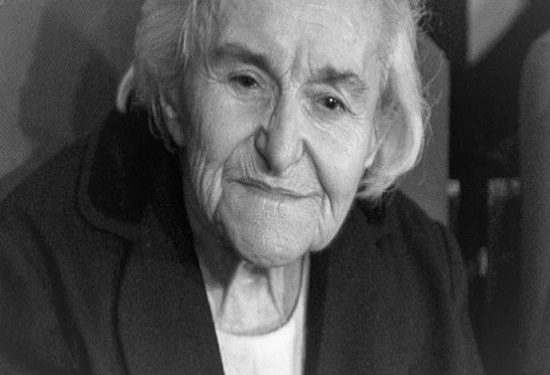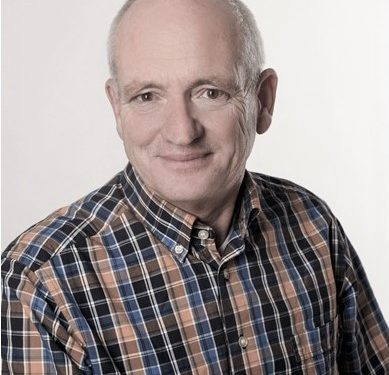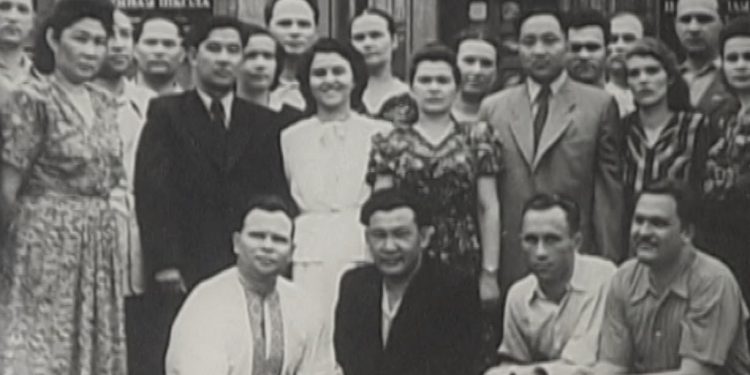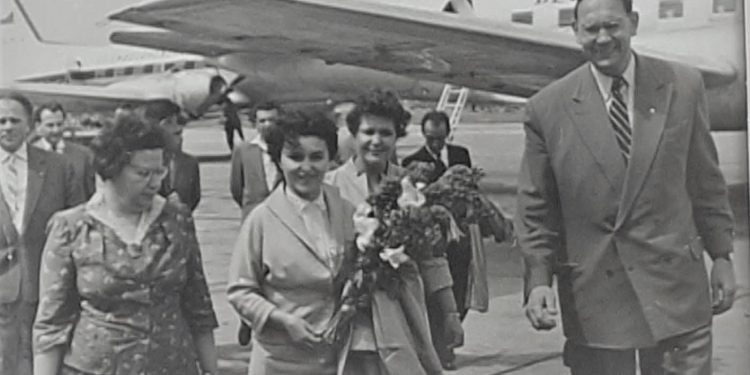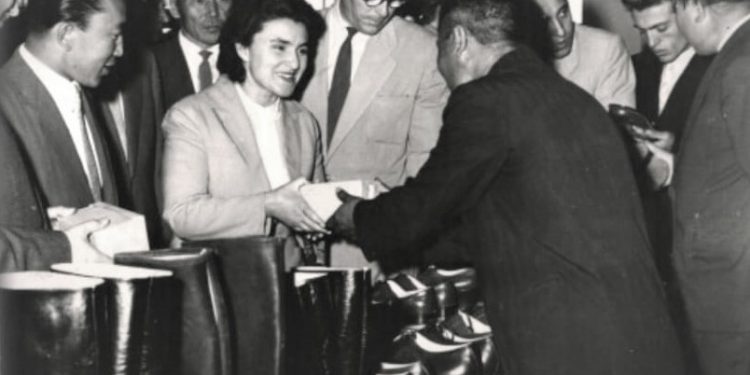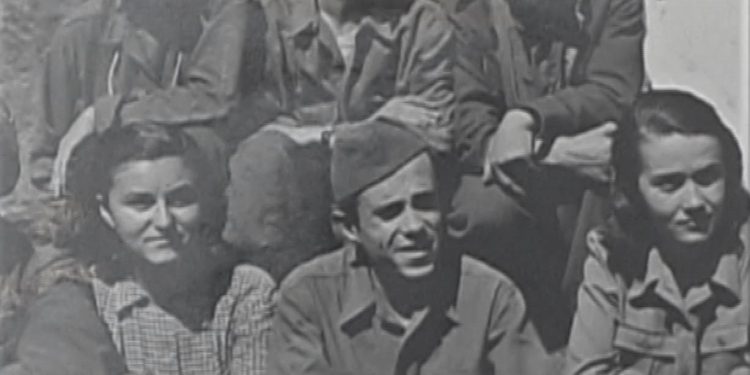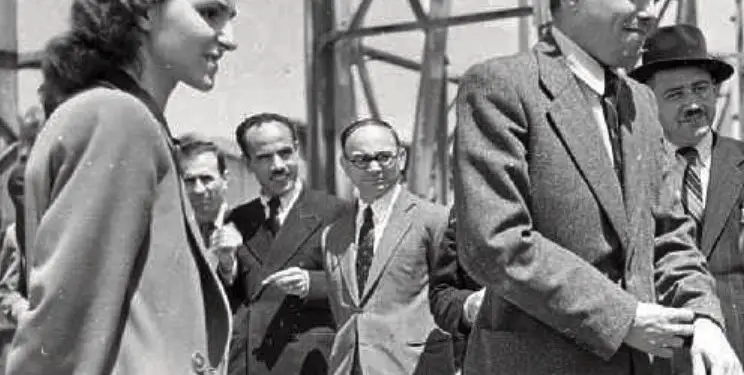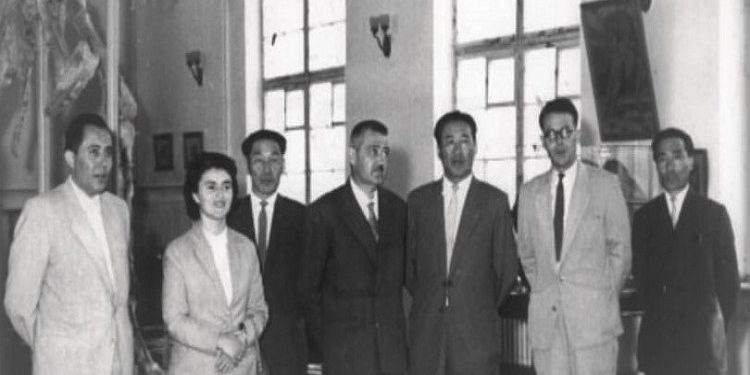By Robert Elsie
Second part
The rare testimony of the former member of the Political Bureau and the secretary of the Central Committee of PPSh, Liri Belishova, in the interview with the British researcher and albanologist, Robert Elsie: “Enver Hoxha was a careerist, Koci Xoxe, ignorant and wild, Mehmet Shehu , Stalinist, Ramiz Alia, characterless”!
Memorie.al / In November 1945, he participated in a world youth congress held in London. In ’46-’47, she was the president of the People’s Youth. When in 1947, her first husband, Nako Spiru, was purged from the party and committed suicide, Lirina was removed from political positions and sent to Berat as a teacher. The reason was her support for Albania’s economic independence from Yugoslavia at the time of the brief alliance between the two countries. Liri Belishova was a very popular personality in the first years of communism in Albania. She was born in 1923, in the village of Belishovë in Mallakastra, from a rich family. In the late 1930s, she attended the “Queen Mother” Institute in Tirana, where she studied for a while as a nurse. Inspired by the novel “Mother” by the writer Maxim Gorky, Liria joined the communist resistance movement during World War II, where she also lost an eye during the fighting. In 1944, Liria was the secretary of the Anti-Fascist Youth Council and at the end of the war she was a member of the Democratic Front.
Continues from last issue
But as the time kept coming, I could not agree, especially when Tuk Jakova and Bedri Spahiu were sentenced. But you did not dare not to defend them, if not to criticize them. And to be honest, at this time I was married for the second time. I had two children. The man, when he married me, had two daughters ie four children.
I had five brothers that I raised by myself because my father died very early. They had finished university, three were married, two were engaged, I had my mother and grandmother, I am leaving my husband’s family. And I knew that my step to oppose Enver would not only cost me personally, that in the end, I was ready, so to speak, to sacrifice myself because I also felt responsibility for this path.
What was their fault? So I have done my best since this time when I started to see more clearly and until I was sentenced, how and how not to create the impression in Enver Hoxha that I have critical remarks, that I do not agree with this path. The 20th Congress played a very important role.
That Khrushchev secret report. I was sick then, after giving birth to my son, and I was in bed for four months. However, Enver Hoxha came to my house, told me very briefly, and from this, I understood that he did not agree with the criticism of Stalin. But even we did not worship Stalin a bit and what had really happened, we were not very clear.
When we read it, the husband (Maqo Çomo), had read it in another place, we both said that; these are also the tip of the iceberg, that Khrushchev was Stalin’s collaborator. Sometimes he doesn’t understand some things himself, but sometimes he deliberately doesn’t tell them because he also burdens him with responsibility.
Yes, and they were enough to say, “What are we going to say now that before we were saying imperialist-bourgeois propaganda”, but now they were saying it themselves. And the issue was here: one can discuss whether the policy of collectivization is right or not, whether the nationalization of the industry of the whole country is right, whether it is profitable or not, and many other things.
This great control over literature, over art, over culture, is it right that there is no relationship with the West, that you can’t read a book, you can’t listen to a radio. All these are discussed and it is understood that the normal person will condemn them, but even the one who is indoctrinated is forgiven for not understanding them immediately.
But a crime is a crime, Robert, right? And when it comes to crimes, for hundreds, for thousands, for millions of people, here it is unforgivable to hesitate and waver, unforgivable. I was impressed later, after the 20th Congress, when I read some of Gorky’s memoirs and letters that were published.
And what Gorky writes about Lenin. It says: “How cruel must this man be who allows an experiment to be made with the lives of millions and millions of people, causing these superhuman sufferings and so many victims and blood.” It shocked me.
Ms. Belishova, when did you know Enver Hoxha?
I met Enver Hoxha for the first time when the Youth Congress was held in Helma, in July 1944. Nakua introduced me. “This is Enver Hoxha” – he told me. I was surprised because everyone else was dressed like a partisan, with a jacket from those of the English, civilian trousers and opings. And he was dressed in the clothes of an Italian officer, very elegant, with polished boots, with hair as if he had done it brilliantly.
“Let the communist leader be like this, the revolutionary…”?!- I thought in surprise. But what shocked me was that the first word he said to me was not “How are you?” I had just left Tirana prison, where terror was at its peak. “How did you allow the enemy Zai Fundo to escape?” You had orders that; to be killed at all costs, Zai Fundo” – he told me. “I was in prison, friend Enver. I don’t know this thing’.- I answered…! “Too bad I don’t know – he told me – the Tirana District Committee is responsible for Zai Fundo. He has done a great harm to the Party…”!
I was a member of the District Committee of Tirana, responsible for the youth, but the thing was that I had been in prison. But for him, killing enemies was an important thing. What I want to say honestly is that I was very sorry when different friends were punished. However, I thought that these comrades must have made serious mistakes and the Party has other data. But I could not agree, especially when Tuk Jakova and Bedri Spahiu were sentenced. I did not dare to protect them.
At this time I was married for the second time. I had two children. When the man married me, he also had two daughters from his first marriage, i.e., I had four children. I also had five brothers in my family that I raised myself, because my father died very early, I had my mother and my grandmother. And I knew that my step to oppose Enver would not only cost me personally, that in the end I was ready to sacrifice myself because I also felt responsibility.
How did you know Mehmet Shehu?
Mehmet Shehu was a convinced Stalinist. Enver Hoxha was different. Enveri joined the communists and decided to make a career. Even if he had connected with the social-democrats, or even with the fascists, his main goal would still have been his career. That man did everything for his career. He did not see what the right is, but what would serve him. And Mehmet Shehu was an idealist Stalinist. He believed in the revolution, the dictatorship, the Bolshevik party, the class war, socialism, etc. But Shehu, compared to Hoxha, had some positive sides.
First, that man was honest; he acted because he thought so. Enver Hoxha was the one who turned the plate where he wanted. He connected with the Yugoslavs to the point that he asked for the union of Albania with Yugoslavia. He expelled the Soviet specialists from Albania so that only the Yugoslavs remained and then immediately when Stalin’s letters arrived he said: I have done this because I was imposed by Koçi Xoxe and Koçi Xoxe ate him. Mehmet Shehu, was against the intervention of the Yugoslavs.
I remember it very well because then I also participated in the meetings of the Bureau. Shehu was also very organized. If we talk about individual roles, those that were built in Albania, in the first place, have the seal of Mehmet Shehu. He was an organizer and very demanding. Enver Hoxha tired you with his talk. Mehmet was determined. Try not to carry out the tasks he gave you. He would wake you up at 00.00 at night, by phone. In that way, he was more patriotic.
What about Koçi Xoxe?
Koçi Xoxe has not been at the level of a leader. He had only completed primary school. Those apologists of his, why have they arranged a certificate that he almost attended the gymnasium of Thessaloniki, but I know very well that he did not attend gymnasium. He was ignorant. But his worst thing was the cruelty he exercised in the name of the proletariat and called himself a proletarian. These others, including Enver Hoxha, were bourgeois intellectuals.
He listened to Hoxha because he was the first and Xoxe was disciplined in this regard. Even when Hoxha proposed that the First Secretary of our Party is Tito and our Party be like the Party of Croatia and Slovenia, Koçi Xoxe, refused. He was uneducated and wild. In his time, terrible tortures were done with his command and knowledge.
You were in that Communist Party, which did these things, why didn’t you withdraw?
All these tortures that have been done, I swear to you on the soul of the girl who died to me, I did not know. I only knew of one case that Nako Spirua told me. It is the case of Kostë Boshnjak, who in his youth was also with socialist-communist ideas with those immigrant organizations based in Vienna, connected to the Comintern, etc. He made him the director of the Bank of Albania after the liberation, but when they arrested the deputies, they also arrested the Bosniak. Under torture, he asked to speak to Nako, because he was a family friend.
They sent Nako and met him. “It seemed like the sky fell on me, not the ceiling on my head, because he was disfigured from the torture” – Nako told me. Kostë Boshnjaku had called Nako to tell him: “Please, Nako, tell him that I didn’t do anything.” Let them shoot me, but I can’t stand the torture.” And Nako experienced this very painfully. He went to Enver. There he also found Koçi Xoxen. Instead of the two of them reacting, Koçi started to move around the room, like a power of wine, as Nako described to me, saying: “This is how these bourgeois are, they can’t stand it, they stuff their panties, while the communists endure all the tortures , die under the pavements”.
It was cruel. Now this happened shortly before the disaster with Nako. And that day, before going to the State Plan Commission, he said to me: “Do you remember Kostë Boshnjaku…”? Yes, I told him. “They have to do the same to me” – he spoke in the dialect of Durrës. And this alone has made me think that maybe it is suicide.
I think he said to himself: “I’m going to die; I’m going to die, as long as I die in such an unbearable and cruel way and to be shamed in front of the Party and the people, one bullet and that’s it.” Three people were present there. But if the Party told them; you mean like that, how would they say otherwise?! You can’t believe anything. But after 60 years, can it be proven? No. So, the known crimes of communism are not all, there are many more.
Have you heard of Musine Kokalari?
Yes, I have known Musine. She was a very intelligent girl. And it’s done with literature. There was culture. He was anti-fascist. During the war, she helped organize anti-fascist women. It was related to Nexhmije Hoxha. I have met him several times. Nexhmija told us once: “Tell Musine that I need a big coat.” She took off her coat and said to us: “Give it to Nexhmija.” Enveri himself had known him as a child; they also had tribal ties with each other. She was brave.
Nexhmije Hoxha, what kind of person was he?
Nexhmija graduated from the same school that I graduated from, the “Nana Mbretneşe” Institute. Then I didn’t have company with Nexhmija, because she was four grades higher than me. But I got to know her during the War and then she seemed like a very good friend, very determined. Nexhmija was a product of Enver Hoxha. As time passed, instead of influencing Enveri, to soften him, on the contrary, it influenced in the opposite way. She proved to be a diligent student in this regard.
They told me that, at a meeting of the Women’s leadership, he came late and after apologizing for the delay, he said: “Now that I came out, Fiqret Shehu came in front of me and wanted to talk to me. But I told the driver to give it to the car because, for ‘enemies of the people’, we have no mercy”. It was a few days after the murder of Memet Shehu. She had Fiqrete as a close friend. They were very connected. Mehmet Shehu, who had served Enver as a dog, went so far as to tell us: “Where Comrade Enver puts his foot, we put our head.” Terrible what they did to the family.
How did you know Ramiz Ali?
Ramizi did not have the nature of Mehmet Shehu, that is, he was not a strong and fierce man, nor devilish and bloodthirsty like Enver Hoxha, but he one of those people who have no character. Enver Hoxha chose Ramiz as his successor and has always kept him under his arm. Ramizi became the secretary of Propaganda and constantly had connections with Enver Hoxha and served him.
All that terrible 30-year propaganda with all those arguments and thousands of tons of letters that made white black and black white, through Ramiz’s hands, have passed. Ramizi has a great guilt because he had to speak the truth about this period that he was with Enver. He was his confidant.
Enveri thought that Ramizi is the best man to govern with Nexhmija. Enveri thought that his family would continue governing. Ramizi, if you had honesty, patriotism, some convictions or political principles, you should have spoken. He wrote a 500 page book that I swear is not true. They are all distorted./Memorie.al




